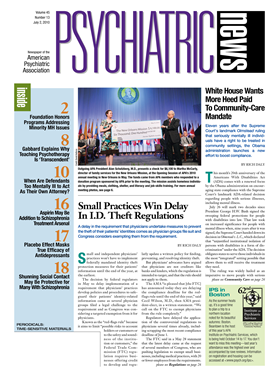People with schizophrenia and diabetes are more adherent to oral hypoglycemia medication regimens than people who do not have schizophrenia, according to an analysis of Department of Veterans Affairs health system data.
This finding, reported in the March Schizophrenia Bulletin, may surprise clinicians used to hearing about the generally poor quality of medical care received by people with schizophrenia. But one psychiatrist who has been a leader in advocating for better general medical care for psychiatric patients says the study results appear to be consistent with previous research suggesting that serious mental illness is often associated with more doctor visits, typically with mental health clinicians who are likely to emphasize adherence to all prescribed medications.
“The overall message is that more visits create the potential for better adherence and better outcomes, and patients with severe mental illness who are being treated tend to have a lot of contact with the health care system,” said John Newcomer, M.D., a professor of psychiatry at Washington University School of Medicine in St. Louis, who reviewed the report for Psychiatric News.
In the study, researchers at the University of Maryland, University of Michigan, and VA Capital Healthcare Network compared adherence to oral hypoglycemia medications for diabetes among 11,454 patients with schizophrenia and 10,560 patients with diabetes who did not have schizophrenia.
They used data from the VA's National Patient Care Database and National Psychosis Registry. Adherence to medication was calculated as a “medication possession ratio (MPR),” derived by summing the total days' supply of medication dispensed from VA outpatient pharmacies, beginning with the date of the first prescription for an oral hypoglycemic in 2002 and dividing it by the number of days' supply required for continuous treatment during outpatient days over a 12-month period.
Nonadherence was defined as having an MPR of less than 80 percent of needed hypoglycemic medications.
They found that poor adherence was less prevalent among diabetes patients with schizophrenia (43 percent) than among those without schizophrenia (52 percent).
Lead author Julie Kreyenbuhl, M.D., and colleagues noted that individuals with schizophrenia showed better adherence despite having higher rates of risk factors that were shown to be independently associated with nonadherence. These factors, which were controlled for in statistical analysis, included black race, homelessness, depression, and substance use disorders.
“However, several characteristics shown to promote medication adherence also occurred more frequently in diabetes patients with schizophrenia,” they said. “These patients had significantly greater contact with the health care system overall, having had significantly more hospitalizations and a greater number of outpatient visits for diabetes-, non-diabetes medical-, and psychiatric-related reasons in the prior year.”
Newcomer told Psychiatric News that the study is not the first to demonstrate the association between frequency of contacts with the health care system and quality of care or health outcome, though the message tends to be obscured by the overall finding of generally poor medical care received by patients with serious mental illness.
He noted that a landmark 11-year follow-up study of mortality in patients with schizophrenia that appeared in the August 22, 2009, Lancet found that the antipsychotic clozapine was associated with lower mortality than other medications—a finding that Newcomer said has been widely interpreted as supporting the deregulation of clozapine. Unrecognized in the interpretation of results, he said, is the likelihood that patients on clozapine had better outcomes because of the greater frequency of contact with the health care system that is required for use of this antipsychotic.
Newcomer added that he believes psychiatry has tended to do a better job of monitoring compliance with medications than other specialties have. “Some of our patients are in and out of the clinic every month, and patients in psychiatric clinics tend to hear the message all the time—‘take your meds, take your meds.’”
